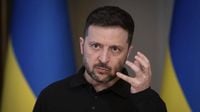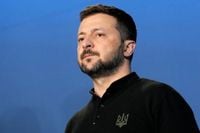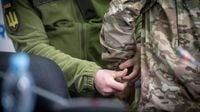In a significant development in the ongoing conflict between Ukraine and Russia, President Volodymyr Zelensky announced on April 17, 2025, that Ukraine has obtained intelligence indicating that China is supplying weapons to Russia. This revelation comes just days after Ukrainian forces captured two Chinese nationals who were fighting alongside Russian troops in Ukraine.
During a briefing in Kyiv, Zelensky stated, "Today, we have general information from the Security Service of Ukraine, from intelligence about gunpowder, artillery." He indicated that detailed information regarding Chinese involvement in the production of weapons on Russian soil would be forthcoming, with a comprehensive report expected to be released around April 25, 2025. Zelensky's remarks mark the first official confirmation from Kyiv that Beijing is actively supporting Russia's military efforts.
This situation is particularly alarming given that in the summer of 2024, Zelensky had claimed that China had assured Ukraine it would not supply arms to Russia. Despite China's public stance of neutrality in the Ukraine conflict, its actions have drawn scrutiny as it continues to strengthen economic ties with Moscow while providing diplomatic support.
The recent capture of the two Chinese soldiers occurred in Donetsk Oblast, where they were reportedly fighting for Russia. Zelensky revealed that there could be "several hundred" Chinese nationals currently involved in combat on Russia's side. One of the captured soldiers disclosed that he had paid 300,000 rubles (approximately $3,500) to a Chinese middleman to join the Russian military, lured by promises of citizenship and financial gain.
In a related event, Ukraine held a news conference featuring the two captured Chinese fighters, which raised ethical concerns regarding the treatment of prisoners of war. The International Committee of the Red Cross has indicated that putting POWs in front of cameras can violate international humanitarian law, yet Ukraine believed that the potential reputational damage was outweighed by the opportunity to showcase the presence of Chinese nationals in the Russian military.
During the press conference, the Chinese POWs, dressed in military fatigues, explained how they had been recruited. One soldier, who had lost his job during the COVID-19 pandemic, mentioned that the prospect of earning 250,000 rubles a month in Russia was a major factor in his decision to enlist. However, upon arrival, he found himself thrust into combat training instead of the medical rehabilitation role he had initially sought.
As the conflict continues, the role of foreign fighters has become increasingly prominent. A list obtained by CNN revealed that by the end of 2024, Ukraine was holding non-Russian POWs from various countries, including Sri Lanka, Nepal, and North Korea. In January 2025, Ukraine had captured two North Koreans, part of an estimated 14,000 troops sent by Pyongyang to assist Russia.
The presence of Chinese nationals in the conflict has raised questions about whether the Chinese government is aware of or has facilitated their recruitment. Zelensky stated that while he does not have definitive answers, he believes that Beijing is aware of the situation. He emphasized that Ukraine is not accusing anyone of giving commands but is investigating the matter further.
Interestingly, the captured Chinese soldiers insisted they were acting independently and pointed to recruitment videos circulating on TikTok as their motivation to join the Russian forces. These videos, which feature Russian soldiers in training and promise financial incentives, have resonated with many in China, where military valor is highly regarded.
The timing of Ukraine's decision to highlight the presence of Chinese fighters is noteworthy. It comes amid Kyiv's efforts to gain favor with the U.S. administration, which has been focused on countering China's influence globally. Analysts suggest that Zelensky's strategy may also aim to counteract recent overtures from the European Union toward China, as both parties seek common ground amid rising trade tensions with the U.S.
In response to these developments, China's foreign ministry urged parties involved to accurately understand China's role and to avoid making irresponsible statements. This statement reflects the delicate balance China seeks to maintain as it navigates its relationship with both Russia and Ukraine.
As the situation unfolds, the implications of China's potential support for Russia could have far-reaching consequences for the dynamics of the conflict. The international community will be closely watching how this situation develops, particularly as Ukraine prepares to release further details regarding its findings on Chinese involvement in the war.
In conclusion, as Ukraine braces for the next phase of the conflict, the revelations surrounding Chinese nationals fighting for Russia and the potential supply of weapons from Beijing add another layer of complexity to an already volatile situation. The world is watching closely, and the stakes could not be higher.






